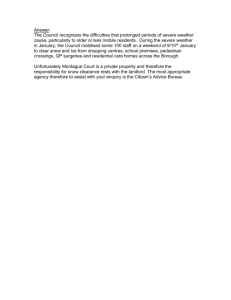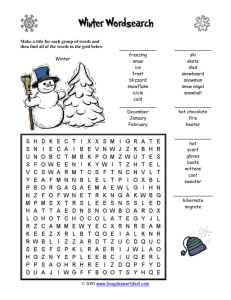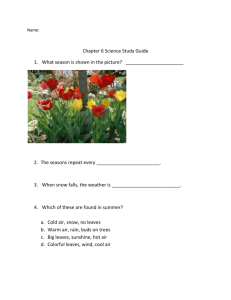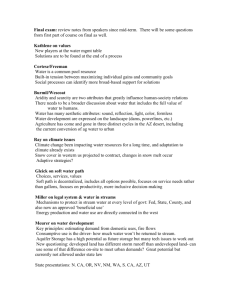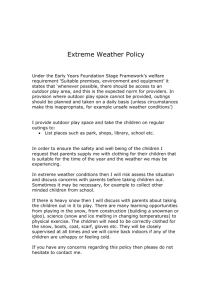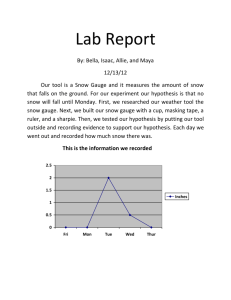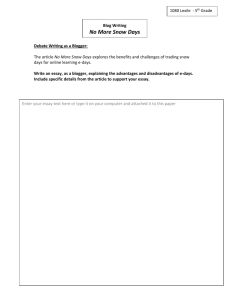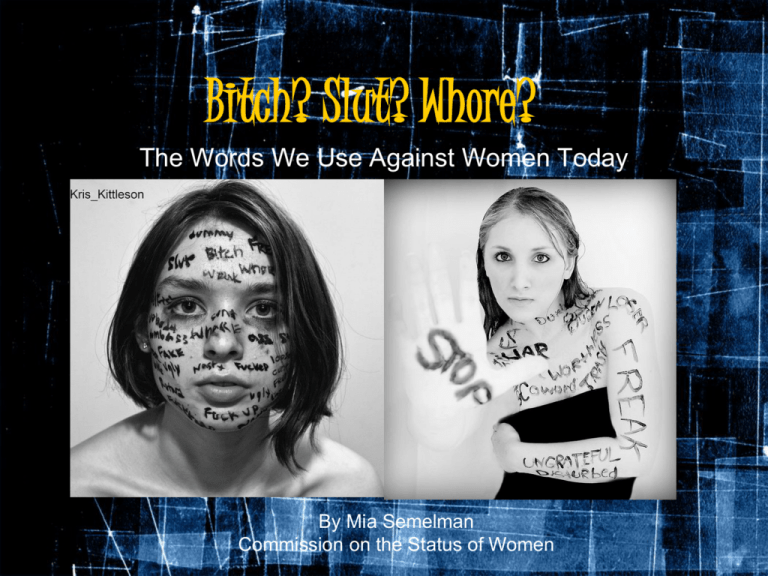
Bitch? Slut? Whore?
The Words We Use Against Women Today
By Mia Semelman
Commission on the Status of Women
What’s this all about?
• Introduction
• Media isn‟t helping: Misogynistic Mash-up
and Queen Latifah‟s response (U.N.I.T.Y.)
• Background: What do these words mean?
• Activity
• Ask Yourself…
• In Conclusion…
• Special Thanks
• Reflection on the Year
Misogynistic Mash-up
U.N.I.T.Y.
Bitch
• The term bitch comes from the word bicche, developed
from the Old English word bicce. It also may have been
derived from the Old Norse word bikkja for "female dog”
(dated to around 1000 A.D).
• Documented to the fourteenth century, it suggested high
sexual desire in a woman, comparable to a dog in heat
• Became a naughty word in Christian Europe because it
was a sacred title of the Goddess, Artemis-Diana, leader
of the Scythian alani or 'hunting dogs.„
• In Christian terms, 'son of a bitch' was considered
insulting not because it meant a dog, but because it
meant the devil -- that is, a spiritual son of the pagan
Goddess
• Remained a strong insult in the nineteenth century
Slut
• The ultimate origin of slut is unknown
• It first appeared in Middle English in 1402 as slutte
(AHD), the meaning "a dirty, untidy, or slovenly woman."
• Geoffrey Chaucer used the word sluttish (c.1386) to
describe a slovenly man
• The modern sense of "a sexually promiscuous woman"
dates to at least 1450.
• Another early meaning was "kitchen maid or drudge" (c.
1450), retained as late as the 18th century, when hard
knots of dough found in bread were referred to as "slut's
pennies."
• In the 19th century, the word was used as a euphemism
in place of "bitch" in the sense of a female dog
• A popular theory connects slut to earlier Germanic forms
meaning "slush" or "mud puddle."
Whore
• The term whore was first derived from the IndoEuropean root kā meaning "desire".
• From kā, the prehistoric Common Germanic word horaz
developed and came to represent "one who desires" and
"adulterer."
• The feminine root of this, *horon-, became hore in Old
English.
• Came to be used metaphorically to mean debasement or
working towards an unworthy cause, “whoring oneself,“
may not include sexual acts
• Largely associated with the word “prostitute,” meaning
sex worker
The Iñupiat peoples of Northern Alaska
have at least eleven words for snow…
•
•
•
•
•
•
•
•
•
•
•
nutagaq: new fresh powder snow
qiqsruqaq: glazed snow in thaw time
sitliq: hard crusty snow
auksalaq: melting snow
aniu: packed snow
aniuvak: snow bank
natigvik: snow drift
qimaugruk: snow drift blocking a trail or a building
aqiluqqaq: soft snow
milik: very soft snow
mitailaq: soft snow on ice covering an open spot
Ask yourself…
• Do you “choose” to not be hurt by these words, or has it
become a matter of survival?
• What does it mean that we live in a culture where it is
“not a big deal” if those closest to us to refer to us in the
most derogatory terms? How would it feel if your loved
ones (parents, etc.) referred to you as a slut, bitch, or
whore, as well as any other vulgar term?
• “When you find yourself choosing what the patriarchy
promotes (e.g. the inferiority of women) it‟s worth asking
yourself if it really is a choice.”
• Some argue that if women use these words to refer to
each other, than it can‟t be sexist. However, sexism and
patriarchy are systems of oppression that should not be
confused with gender. Both genders can perpetuate
sexism, but within patriarchy, only one gender (men) is
given unearned advantage.
In Conclusion…
“Names are used recklessly in our lives. This
means that they are tossed around without much
thought about what they really mean or how
much they hurt others. They may be used as so
called jokes, to get back at others, to go along
with the crowd, and because of prejudice and
fear of differences. But the names we carelessly
toss around are often rooted in cruelty and have
long histories of hate. Perhaps if we better
understood how these names came to be and
how they affect other people, we might think
twice before using them?”
Resources
• http://theurbandaily.com/music/jbarrow/10misogynistic-rap-songs-that-women-lovensfw/
• http://www.womenscenter.uconn.edu/VAW
PP/sublinks/6_things/1_Stop_Using_Sexis
t_Language.pdf
• http://www.nonamecallingweek.org/binarydata/NoNameCalling_ATTACHMENTS/file
/36-1.pdf
Who You Callin’ A Bitch?
A Special Thanks to…
• Seren Pendleton-Knoll
• The Commission of the Status of Women
especially Gianna Driver, Honora Miller,
and Martina Tello
• San Mateo County Youth Commission and
staff
Reflection on the Year
• I‟m happy with my project as a whole,
although I wish I could‟ve reached a bigger
audience
• All participants reported that the quality of
sound was the only weak thing about this
workshop
• I‟ve really enjoyed being a part of this
Commission and am sorry to say I won‟t
be returning next year

